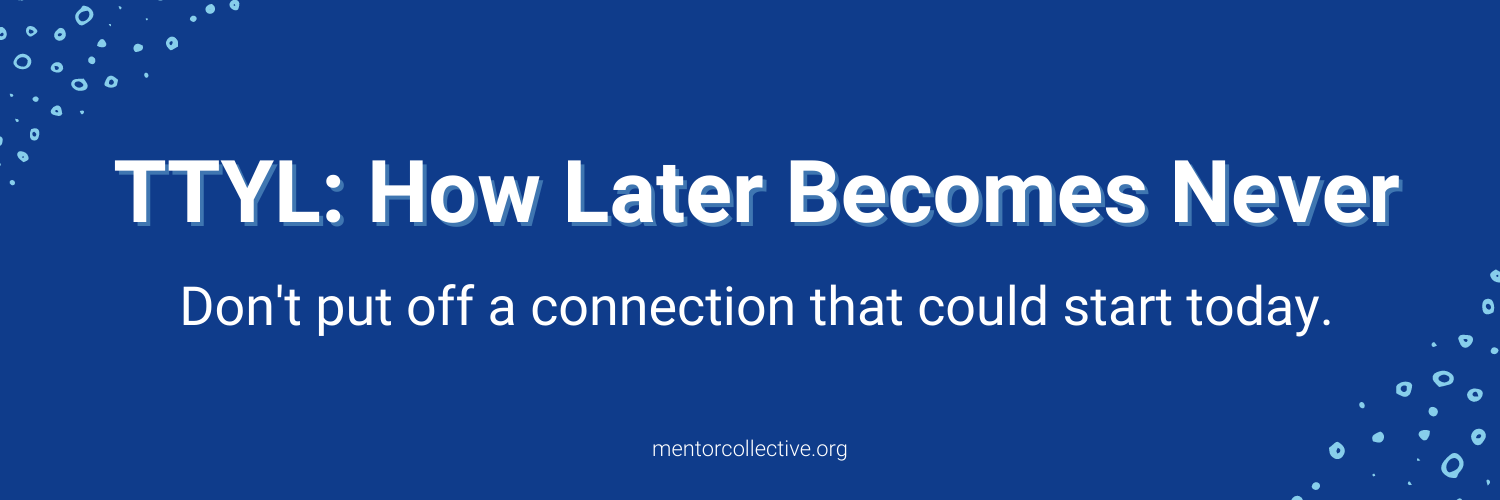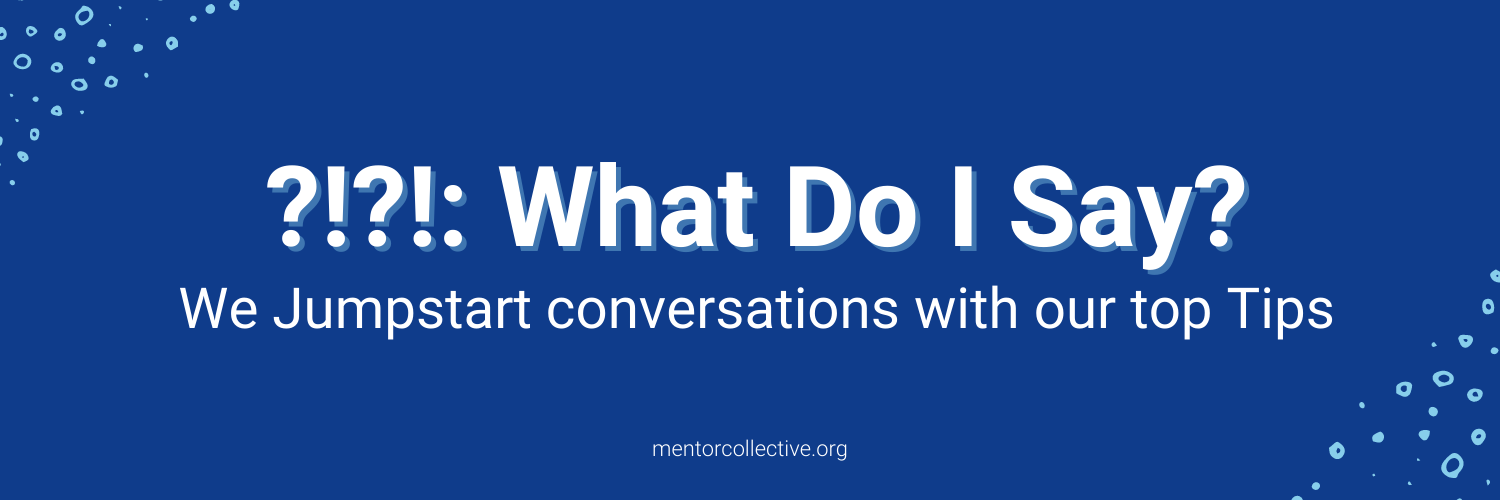“In the best conversations, you don't even remember what you talked about, only how it felt."
- John Green, Turtles All the Way Down
When I think back on the best conversations with my mentors, be they my peers or folks older than me who I wished to learn from, this quote from John Green rings true. By the end of our time together, I felt reassured about a challenge I was having. Or I felt inspired to tackle the last hard bit of a project. Or I felt curious enough to ask more questions about a problem I wanted to solve. But all these conversations had one thing in common: they happened.
A conversation that doesn't happen, can never inspire people to action. So today we're talking about a common problem in mentorship relationships: ghosting.
While the term rose in popularity in the world of dating, it's not uncommon in any relationship that starts (or exists) electronically. One person reaches out, the other never replies...boom. Ghosted. But at Mentor Collective, we don't just see ghosting as the end of a text thread. We see it as a lost connection. A lost opportunity. A lost chance to get something meaningful from someone with wisdom, support, or gratitude to share.

It's easy to jump to conclusions when your message doesn't get answered. The brain can go to nervous places: "did I say the wrong thing?" It can go to confused places: "didn't they want to hear from me? Why haven't I heard back?" Or it can go to offended and frustrated places: "I can't believe they don't just answer - how rude!"
In these moments, it may be useful to know that Wiley (yes, the name you may know from your textbooks) and the WICHE Cooperative for Educational Technology (WCET) have pinpointed three incredibly common reasons why people ghost from academic opportunities.
- Lack of Connection
- Lack of Support or Resources
- Lack of Shame Resilience
We'll go through each of these reasons, explore what resources Mentor Collective has to address them, and even share advice from current and former mentors and mentees to overcome it.

Lack of (Initial) Connection
I've added a bit to this first reason for clarity: a relationship can't stop if it's never started! And this is quite common.
A student, overwhelmed by their responsibilities for the start of the year, signed up for a program. A few weeks later, they start getting emails and texts from addresses they don't recognize - and it gets easier to just ignore them. Or, just as common: a student signs up for a mentor to have on call "just in case," but then the "in case" never comes.
So we're clear, a mentor can ghost as well! Getting that first message, vowing to address it "when I have time," and then letting it drift into an abyss, can happen. But no matter how it starts, the result is often the same: no meaningful connection.
To avoid this scenario, we offer these tips:
- When you get that first message from our system alerting you, send a quick hello to introduce yourself. Right away, as soon as the message comes in. Unsure of what to say? Check out our Tips for Your First Message guide in the Resources tab of your dashboard.
- Set up your first meeting, and maybe 1-2 times to connect, early. (Then, use our First Meeting Checklist to make sure you can make the most of that time together)
- Once the meeting is set, take notes about what you'd like to accomplish together (our Jumpstart Questions have lots of ways to get and keep your conversation going)
An object in motion, can remain in motion. So commit yourself to setting the conversational ball rolling, for your best chance at mentorship success.
Lack of Support or Resources
With that said, it is incredibly common for conversations to stall over the course of a mentorship. When we talk to mentors and mentees about why their conversations have lapsed, many mention being unsure how to (a) keep their conversations going, or (b) resolve a challenge that a mentee has voiced. As the list in the previous section might suggest, we have no shortage of resources to support our program participants. In addition to the ones listed, we also offer:
- Over 40 guides on common topics of conversation like Emotional and Mental Health, Developing Strong Study Skills, Effective Interviewing, Perfectionism, and more
- A library of Mentor Briefings, designed to bring mentors up to speed on topics important to mentees like financial aid and Title IX
- A training certification for mentors and an expectations course for mentees
- Mentor Office Hours for mentors in select programs to connect and advise one another through the mentorship experience
- A team of helpdesk staffers committed to offering quick answers to your questions via email or text
I know it can be nerve-wracking having to talk to someone you just met, or you [are] just not ready yet, but remember: they are there to help you. No question is dumb to them because they are there for you. They won't belittle you, they are [...] there to lead your early steps.
- Abel, San Francisco State University
Even when you have the tools and the path forward clear, we do also want to acknowledge that meeting and building relationships with new people isn't easy! What's more, many of us are rusty at it - thanks in part to the pandemic. So if what's holding you back from keeping your relationships going isn't the time or the tools, we want to share these tips with you (more of them live in our Tips for Your First Message guide):
- If you’re nervous about sending a message, know that you’re not alone. Many people experience nervousness when interacting online or electronically. Knowing that you’re not the only one to go through this experience can be a relief.
- Sending someone an intentional message means that you want to connect with them. That's a very human thing to want, and far more people want it than don't! (Especially those volunteering to be in this relationship with you. Your first message doesn't have to establish you as best friends, and it doesn't have to lay out your life story. It's an invitation to build a stronger connection by saying hello and asking questions. Putting this all in perspective can help if you’re feeling overwhelmed by the situation.
- If you find yourself obsessing about what to say in the first message, take a deep breath and a step back from your phone or computer. Get outside of the house and take a walk around the neighborhood. Don’t forget to leave your phone behind, or at least silence notifications for a set amount of time. These small breaks can help you release anxiety, and give you additional perspective about what you're going to do.
- Remember, mentorship is designed to help you grow. Over time, whether you're the mentor or the mentee, this relationship is designed to push you and help you grow. Sending that first message, whether it seems like it or not, is part of that growth process. You have what it takes to do this - and if you get stuck, your program and Mentor Collective are here to support you.
Still Not Hearing Back?
Even if you account for all these possible reasons for ghosting in your mentorship, it's still possible that you won't hear back. In our experience - and this part's important - it's not your fault.
Brianne, a mentor from CSU Northridge, wanted us to share this reminder with incoming mentors and mentees:
If any of your mentees stops responding to messages, stay calm and try not to take it personally. Everyone is going through different struggles and you never know what may have happened. Reach out once [and] be kind and supportive, before reaching out to Mentor Collective to let them know you need help.
Should you find your messages met with quiet, you can consider:
- Reaching out through more than one method. If you've tried emailing and you haven't heard anything, you can send a text - be sure to include your name and reason for texting early!
- Sending a more captivating form of message! Try sending a voice memo or video message to make your outreach stand apart from other texts or emails.
- Including your identifying info early. Whether this is in the start of a text (so it shows up in preview), or in the subject line of an email, making your identity known early could help keep you from being "screened" out.
- Remember: like Brianne said, you never know what someone else is going through. It's possible your mentor or mentee is busy, overwhelmed, detoxing from technology, or has other reasons for not responding. Stay positive, and try again in a few days or weeks.
Bella, a mentee from CSU Northridge wanted to share this advice for those who might be tempted to "ghost" their mentor or mentee because they're busy:
Keep in mind, your [response] doesn't have to be long! If you're busy and just want to let them know where you are in your walk, you can tell them. It doesn't have to be long if you're short on time.
We love this advice. If you're busy, and your mentor or mentee reaches out at an inconvenient time...let them know! Even if the message is short, it can go a long way for maintaining the relationship. That way, when you're ready to talk more, you'll have a stronger connection to return to.
Don't let the fear of the unknown hold you back - so many of our mentors and mentees have had wonderful experiences once their earliest message got sent, and built on those experiences with every returned message or mentorship meeting. Mentorship is a wonderful opportunity to build a meaningful relationship, and it all starts with saying "yes" to your part in keeping the conversation alive.

